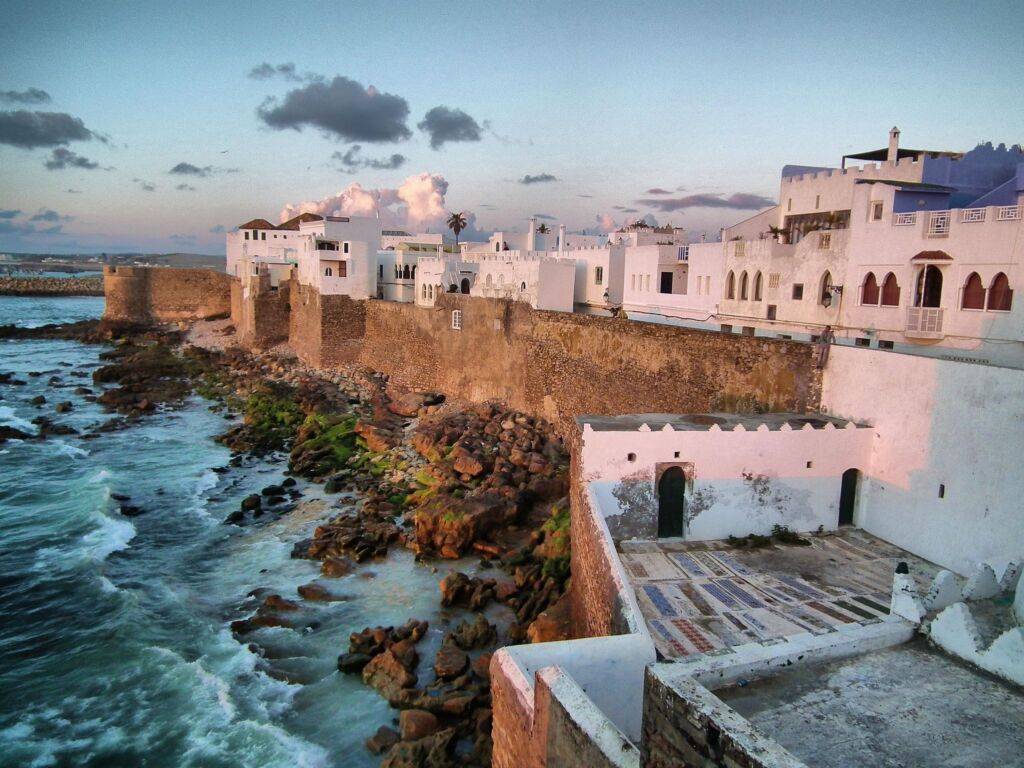Morocco is located in North-West Africa on the Atlantic Ocean and Mediterranean Sea. Its area is about 710 850 km² and population around 38 million. The capital is Rabat, the largest city is Casablanca. Official languages are Arabic and Tamazight. The currency is the Moroccan dirham (MAD). Morocco is a constitutional monarchy with a parliamentary system.
History
Neolithic settlements indicate early habitation, followed by Berber tribes and Roman provinces. Islam arrived in the 7th century, and several dynasties—Idrisid, Almoravid, Almohad, Saadian and Alaouite—ruled over the territory. In 1912 Morocco became a French and Spanish protectorate, gaining independence in 1956. Since then the Alaouite dynasty has ruled under a framework of cautious reform.
Statistics
Morocco’s GDP is about USD 140 billion nominal, GDP per capita around USD 3 600. Official unemployment ranges from 9 % to 12 %. The Human Development Index is approximately 0.68, placing Morocco in the high human development category (around 121st out of 191 countries).
Industry
Key industries include phosphate mining (Morocco holds 75 % of world reserves), energy production (hydroelectric), textile manufacturing, food and chemical industries, automotive and aerospace clusters. Agriculture remains significant—olives, citrus, fruits, vegetables. Large investments are made in renewable energy and infrastructure.
Religion
Islam is the state religion. Muslims account for about 99 % of the population, Christians about 0.8 %, Jews and other faiths around 0.2 %. Sufi traditions and local Berber spiritual practices influence everyday life.
Standard of Living and Corruption
Living standards are rising thanks to tourism and services, but remain below European averages. Morocco ranks 123rd by HDI and around 94th out of 180 on the Corruption Perceptions Index, scoring 38 out of 100. Corruption risks appear in public procurement, utilities and traffic police.
Wars and Conflicts
Since 1975 Morocco has been engaged in the Western Sahara conflict with the Polisario Front, resulting in a frozen dispute and refugee camps. Sporadic terrorist incidents occurred in the early 2000s, but stringent counter-terrorism measures since 2011 have minimized threats.
Tourism and Attractions
Morocco draws millions of visitors to the medinas of Fez and Marrakech, the bustling Jemaa el-Fnaa square, palaces of Bahia and El Badi, and Hassan II Mosque in Casablanca. Chefchaouen’s blue walls enchant photographers. The Atlas Mountains offer waterfalls, Berber villages and Toubkal treks. Sahara dunes at Merzouga allow camel rides and desert camps. Atlantic resorts Agadir and Essaouira are popular for surfing and beaches. Toubkal and Ifrane national parks invite eco-tourism and alpine trails. Kravice and Skakavac waterfalls, Vjetrenica Cave and pilgrimage site Medjugorje also enrich the offering.
Why Visit
Morocco blends African and Arab cultures with European heritage, offering landscapes from snowy mountains to desert dunes. Affordable prices, genuine hospitality and cultural depth attract diverse travelers.
Safety and Terrorism Threat
Morocco is generally safe. Serious crime is rare and confined to pickpocketing in crowded areas. Some rural zones may still harbor unmarked landmines—stick to official tours. Terrorism risk is low; avoid political demonstrations and extremist rallies.
Service and Hotels
Major cities feature international hotel chains, boutique riads and apartment hotels with European-level service. Smaller towns offer guesthouses and family-run pensions with traditional hospitality.
Types of Tourism
Cultural-historical tours of medinas, religious pilgrimages, adventure tourism (skiing, rafting, mountain biking), eco-tourism and trekking, culinary tours, beach holidays and water sports on the Atlantic and Mediterranean, spa and wellness retreats.
Entry Rules and Visas
Citizens of EU countries, the US, Canada, Australia, Turkey and Russia enjoy visa-free entry for up to 90 days. Others must obtain a visa from Moroccan consulates. Requirements: passport valid for at least six months after departure, proof of accommodation and sufficient funds.
Transport, Car Rental, Driving and Police Bribes
Intercity buses link major destinations. Rail service is good between Casablanca, Rabat, Fez and Marrakech via ONCF. Urban transport includes buses, minibuses and taxis; trams run in Casablanca and Rabat. Car rental requires an international driving permit and credit card deposit. Roads on plains are well maintained; mountain roads are narrow and winding. Traffic ticket disputes may prompt informal “coffee” offers from police—bribes are not required but can expedite matters.
Daily Budget
Budget travelers need USD 30–40 per day for hostels, street food and public transport. Mid-range tourists spend USD 60–100 on 3–4 star hotels, restaurants and guided tours. Luxury travel with 4–5 star hotels, private transfers and activities starts from USD 150 per day.
Climate and Best Time to Visit
Morocco’s climate is Mediterranean on the coast, continental in the interior and arid in the south. Summers are hot and dry (25–35 °C on the coast, up to 45 °C in the desert). Winters are mild at the coast (10–20 °C) and snowy in mountains (down to −5 °C). Best travel seasons are spring (March–May) and autumn (September–October) for comfortable sightseeing. Beach season peaks July–August. Winter (December–February) suits ski enthusiasts.
- Ratmanov Island
- Georgia
- Lithuania
- Garden Route: живописная дорога вдоль океана
- Germany
- Kahovka
- Uluṟu-Kata Tjuṯa and Kakadu National Parks Etched in Time
- Bosnia and Herzegovina
- Colombia
- Finland
- Brest (Belarus)
- Чаепитие в 5‑звездочном отеле Mount Nelson в Кейптауне
- Weekend in Moab: Arches, Canyons, and the Spirit of Adventure
- Everyone says i’m running away
- Greece
- And in Africa the mountains are this high
- Lifehacks for buying airline tickets
- Kenya Nchi Yangu Song
- Egypt
- Indonesia

 United States
United States